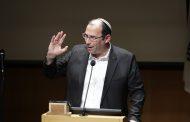“And of all that lives, of all flesh, you shall take two of each into the ark to keep alive with you; they shall be male and female.” Genesis 6:19 (The Israel Bible™)

Businessman on blurred background using modern DNA structure 3D rendering (Shutterstock)
A new project described by its Smithsonian-based directors as the “most ambitious project in the history of modern biology,” will map the genetic codes of all 1.5 million known plants and animals. The researchers involved in the project hope it will be a scientific Noah’s Ark, enabling scientists to study species after they have gone extinct.
Some scientists are less impressed by the project. Dr. Nathan Aviezer, a physics professor at Bar Ilan University who is a learned and devout Jew, emphasized that as the science of genetics stands right now, the project falls short of the original Ark as a means of repopulating the planet.
“Knowing how the genetic material comes together does not mean they know how to make a living thing,” Dr. Aviezer told Breaking Israel News. “Having the blueprints doesn’t mean you know how to build a building. And that is what they are doing; mapping genetic material and no more.”
Even at that more mundane level, the project is an impressive undertaking. At a cost of $4.7 billion, the Earth Biogenome Project (EBP) hopes to map the genomes of all the known species of plants and animals over the next ten years. Led by researchers from the Smithsonian Institution,the world’s largest museum and research complex, 24 scientists from around the world will take part in the project.
Mapping genes entails identifying the chemical code of the DNA contained with the nucleus of the organism’s cell. Currently, less than 0.2 percent of the Earth’s species have been sequenced, and even when complete, the project will not have mapped them all. There are an estimated 10 to 15 million species that are currently uncatalogued and will not be included in the EBP. Most of these are single cell organisms and small insects in the oceans.
The project is a continuation of the Human Genome project completed in 2003 which succeeded in decoding the human genome. That project, focusing on one species, took fifteen years and cost $3 billion.
John Kress, a research botanist for the Smithsonian Institute who is helping to run the project, explained some of the motives behind the ambitious project.
“We will build a complete library of life that we can sample and delve into for whatever purpose,” Kress said in an interview to the Times. “We can use it for improving our environments and ourselves and revolutionizing our understanding of the evolution of life.”
In addition, the project would serve as a scientific Noah’s Ark, preserving the genetic knowledge of species for studying after they have become extinct.
“We know extinction rates today are a thousand times higher than they would be if there were no humans,” Kress said to the Times. “One of the purposes of [the EBP] will be maintaining some knowledge of species currently on the verge of extinction. We are going to generate genomes from species that we would know nothing about in ten years.”
Rabbi Avraham Arieh Trugman, director of the Ohr Chadash Torah Institute, had reservations about the project, suggesting that the resources might be better used in different areas.
“Before worrying about creating a future Noah’s ark through genetics and cloning, the human race should take the many positive steps available politically and environmentally so we wouldn’t have to worry about how to cope with global destruction,” Rabbi Trugman told Breaking Israel News.
“With nuclear and biological weapons and human influence on the environment and climate, we are inviting our own demise.”
Rabbi Moshe Avraham Halperin of the Machon Mada’i Technology Al Pi Halacha (the Institute for Science and Technology According to Jewish Law), did not believe it was a religious imperative to create a Noah’s Ark to save species from extinction.
“As Jews, we are prohibited from causing sorrow to animals, but we are not commanded to ensure their future,” Rabbi Halperin told Breaking Israel News. “That is God’s function. God’s decisions take into account different factors than those of men. We are commanded in how we relate to other men and the commandments we have in that regard are quite explicit and all-encompassing. Too much compassion for animals may not be a good thing.”
Rabbi Halperin told a powerful story to illustrate his point. The Maggid Moshe Darshan, a Polish rabbi from the 18th century, was traveling on a train in Germany when he saw a man kissing and hugging his dog. Rabbi Moshe commented, “In this country, there will come a day when they will slaughter people.”
Rabbi Moshe referenced the Prophet Hosea as the source for his shocking prediction.
And now they go on sinning; They have made them molten images, Idols, by their skill, from their silver, Wholly the work of craftsmen. Yet for these they appoint men to sacrifice; They are wont to kiss calves! Hosea 13:2
Less than 100 years later, Rabbi Moshe Darshan’s prediction came true when Nazi Germany instituted concentration camps for its genocidal Holocaust against the Jews.
“Men are commanded to relate to mankind,” Rabbi Halperin concluded. “If we confuse animals with men, showing an inordinate amount of compassion to animals and placing them before people or even at the same level, in the end, there will be no compassion.”
The EBP has attracted criticism from religious circles for more than just copying Noah’s Ark. Researchers are now experimenting with editing genes, and gene mapping is a part of that process. Critics claim the scientists are playing the role of God. Professor Aviezer is less concerned about this aspect of the research and believes that it can lead to a love of God.
“We are supposed to play God, even obligated to do so,” Dr. Aviezer argued. “Everything we do in the world is a partnership with God. Baking a cake is a partnership. God creates all the ingredients, makes the wheat grow. We make the flour and bake it.”
“Science is an enterprise to search for the truth,” he said citing Rabbi Moses Ben Maimon, a renowned Torah scholar from the Middle Ages, who is known by the acronym “Rambam.”
“The Rambam stated that love of God comes from studying nature. Judaism at its core encourages science. Science tells you how to make a bomb but your connection with God determines what you will do with it.”







